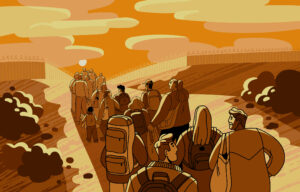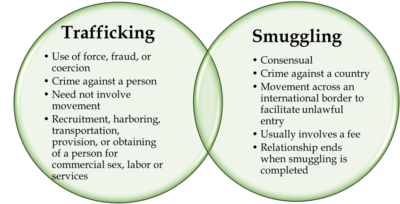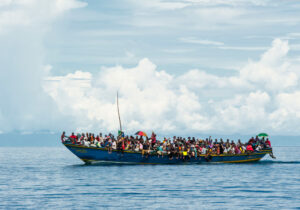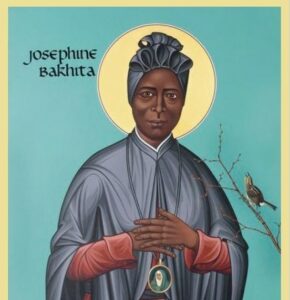Hidden in Plain Sight: A USCCB/MRS Antitrafficking Newsletter
July 2023; Issue 4
Preparing for National Migration Week: September 18 – 24, 2023

In a world marked by immense suffering, the plight of migrants and refugees stands out as a pressing global issue. The World Day of Migrants and Refugees (WDMR) is an opportunity for the global church and the Catholic faithful to pray, reflect, and act on behalf of our brothers and sisters who are forced to flee their homes. National Migration Week is a uniquely US-based celebration that builds on the ideas in WDMR and is shaped accordingly by the American public. In 2023 we will celebrate National Migration Week September 18 – 24, culminating with WDMR that Sunday the 24th.
This year’s theme, “Free to choose whether to migrate or stay,” highlights the root causes of migration. In many instances, war and conflict have left people with no option but to abandon their homes and seek safety elsewhere. The Syrian conflict, for example, displaced millions, creating one of the largest refugee crises in modern history. More recently, the Russian invasion of Ukraine displaced hundreds of thousands, many of whom fled to neighboring countries for safety. In both cases, migration is not a choice but a necessity for survival. Many of those who migrate by necessity are left increasingly vulnerable, and it is not unusual for them to be put at risk of human trafficking and other perils.
Pope Francis emphasizes the importance of understanding the systemic factors contributing to forced migration, such as political instability, economic inequality, and persecution. Through advocacy, education, and charitable works, the Catholic faithful can work to create a world where individuals and families are free to choose whether to migrate or stay in their homelands. By addressing these issues, we can help create the conditions for people to live in safety and dignity, regardless of where they call home. Let us use this National Migration Week and World Day of Migrants and Refugees to deepen our understanding of the complex issues driving forced migration and renew our commitment to building a just and inclusive world.
Migration and Human Trafficking
Migrants, particularly those who are forced to flee their homes, are particularly vulnerable to trafficking situations. Instability caused by conflict increases the chances of victimization. Environmental and other forms of displacement can leave people desperate and willing to take risks that they would have otherwise avoided. According to the International Organization for Migration (IOM) report on Human Trafficking in Ukraine, four factors heighten vulnerability to trafficking: State collapse; forced displacement; humanitarian need and socioeconomic stress; and social fragmentation and family breakdown.
In the case of Ukraine, state collapse has not occurred, as it remains functionally intact and has not devolved into warring factions but remains united against external factors. The second factor, forced displacement, is a very real challenge in the region; since February 24, 2022, 8 million Ukrainian refugees have been recorded across Europe, and nearly 7 million people have been displaced within Ukraine. The Russian invasion of Ukraine has led to the breakdown of family structures, putting women and children at heightened risk of victimization. The fragmentation of social and family structures erodes protections and thus leaves countless people vulnerable.Ninety percent of displaced persons are women and children, mostly likely because men between the ages of 18 and 65 are recruited to serve in the military. As the war continues, there are expected to be an increase in vulnerable populations as more people lose their jobs and are pushed into poverty.
Human Smuggling vs. Human Trafficking

It is always important when speaking of migration to carefully distinguish situations of human smuggling and human trafficking. Although there is often overlap and one can easily bleed into the other, they are conceptually distinct phenomenon. When legal means are not available to migrate, people desperate to leave dangerous or otherwise inhospitable situations in their home countries will often migrate using irregular routes. As such, migrants will often turn to smugglers to help them travel from their home country to their final destination. Criminals exploit the human desire to improve their life circumstances, using forced migration as an opportunity to generate profit on the backs of others. Many routes for smuggling and trafficking overlap, and promises of security or even threats to the safety of one’s family are used to bring people into trafficking networks. Human trafficking also fuels other forms of modern-day slavery, including sexual exploitation, forced labor, and debt bondage. People who have been trafficked are often hesitant to report to the authorities because trafficked people are criminalized in many parts of the world instead of being treated with care and support. For a better understanding of the differences between human trafficking and human smuggling, please see the image below:
 Lost at Sea
Lost at Sea
Every year, thousands of migrants make the dangerous journey across the Mediterranean Sea, hoping to pass through Libya and into Europe. In Libya, migrants are exposed to extreme atrocities and acts of violence, like kidnapping, torture, and extortion. The migrants who make this trek know the risks; however, this journey across the Mediterranean seems like the only immediate and available option for many.
Although not an example of human trafficking, the recent migrant shipwreck just off the coast of Greece that killed migrants from Pakistan, Egypt, Syria, Afghanistan, and Palestine reveals the dangers and vulnerability of migrants forced to take irregular and unsafe routes in the hope of finding safety and security. The overcrowded fishing boat was believed to have 750 migrants seeking asylum. At least 80 died, but an estimated 500 are missing and assumed dead. When there are no laws that enable safe and legal migration, this creates an opportunity for migrant smugglers to take advantage of people who want to escape hardship and find a better life for themselves.
World Day Against Trafficking in Persons
World Day Against Trafficking in Persons takes place on July 30th; this campaign was started by the United Nations Office of Drugs and Crime (UNODC) to raise awareness of developments and trends of human trafficking. The UNODC takes a moment and calls the government, law enforcement, social service providers, and other members of society to work together to identify, protect, and support victims of trafficking.
The theme for 2023 is “Reach every victim of trafficking, leave no one behind” The 2022 report conducted by the UN office showed the lack of reporting and detection rates in the past two years. Due to the COVID-19 pandemic and the isolation of people that ensued, opportunities to detect human trafficking situations was significantly decreased. This resulted in a substantially lower reported number of victims and an under-reporting of trafficking situations. Moreover, the UNODC report mentions that most victims self-rescue and, if they turn for help at all, reach out to authorities on their own accord and at their own risk.
Spotlight: The Amistad Movement Resource
The Amistad Movement is a campaign led by the USCCB founded on the Catholic principle of subsidiarity intended to empower immigrants and immigrant communities. The program provides immigrants in at-risk communities with education resources that can help them become aware of the factors that make them vulnerable to trafficking and to equipped them with tools to protect themselves against victimization. There are four main goals of the Amistad Movement: 1) To educate and empower immigrants through educational workshops and training; 2) create and strengthen peer educators within the communities; 3) establish trust between immigrant communities and law enforcement; 4) form relations and meaningful coalitions with local NGOs and governments programs committed to fighting against human trafficking. Ultimately, the program helps fill the gap in prevention training for immigrant communities and supports local communities at the center of the problem. The educational tools are accessible for all to become more informed on protecting vulnerable immigrant populations from trafficking.
Introducing Our MRS Intern!
 My name is Janah Richardson, a rising sophomore at Princeton University and a prospective Public Policy major in Princeton’s School of Public and International Affairs. I completed an immersive and experiential 6-week global seminar in Kenya this summer. While studying abroad, I learned about Kenyan history, the country’s role in regional and international politics, and specifically, why the West is politically and economically interested in Kenya. I am very excited to join MRS for the summer because I am passionate about the intersection of faith, advocacy, education, and politics. Working with the USCCB provides me with a unique opportunity to use my Christian faith to advance the kingdom of God and promote and defend the dignity of migrants worldwide. I am excited to learn more about migration-related issues and the role of the Catholic faith in leading and supporting the cause.
My name is Janah Richardson, a rising sophomore at Princeton University and a prospective Public Policy major in Princeton’s School of Public and International Affairs. I completed an immersive and experiential 6-week global seminar in Kenya this summer. While studying abroad, I learned about Kenyan history, the country’s role in regional and international politics, and specifically, why the West is politically and economically interested in Kenya. I am very excited to join MRS for the summer because I am passionate about the intersection of faith, advocacy, education, and politics. Working with the USCCB provides me with a unique opportunity to use my Christian faith to advance the kingdom of God and promote and defend the dignity of migrants worldwide. I am excited to learn more about migration-related issues and the role of the Catholic faith in leading and supporting the cause.
A Prayer World Day Against Trafficking in Persons
 St. Josephine Bakhita, you were sold into slavery as a child and endured untold hardship and suffering.
St. Josephine Bakhita, you were sold into slavery as a child and endured untold hardship and suffering.
Once liberated from your physical enslavement, you find true redemption in your encounter with Christ and his Church.
O St. Bakhita, assist all those trapped in a state of slavery; Intercede with God to release them from captivity. Those whom man enslaves, let God set free.
Provide comfort to survivors of slavery and let them look to you as an example of hope and faith. Help all survivors find healing from their wounds. We ask for your prayers and intercessions for those enslaved among us. Amen.
If you see something or suspect someone is a victim of human trafficking, reach out to the National Human Trafficking Hotline
Phone: 1 (888) 373-7888
SMS: 233733 (Text “HELP” or “INFO”)
If you want to learn more about the USCCB/MRS Anti-Trafficking Program, reach out to:
Felicitas Brugo Onetti
Anti-Trafficking Education and Outreach Coordinator
Email: FOnetti@usccb.org
Phone: (202) 541-3064
